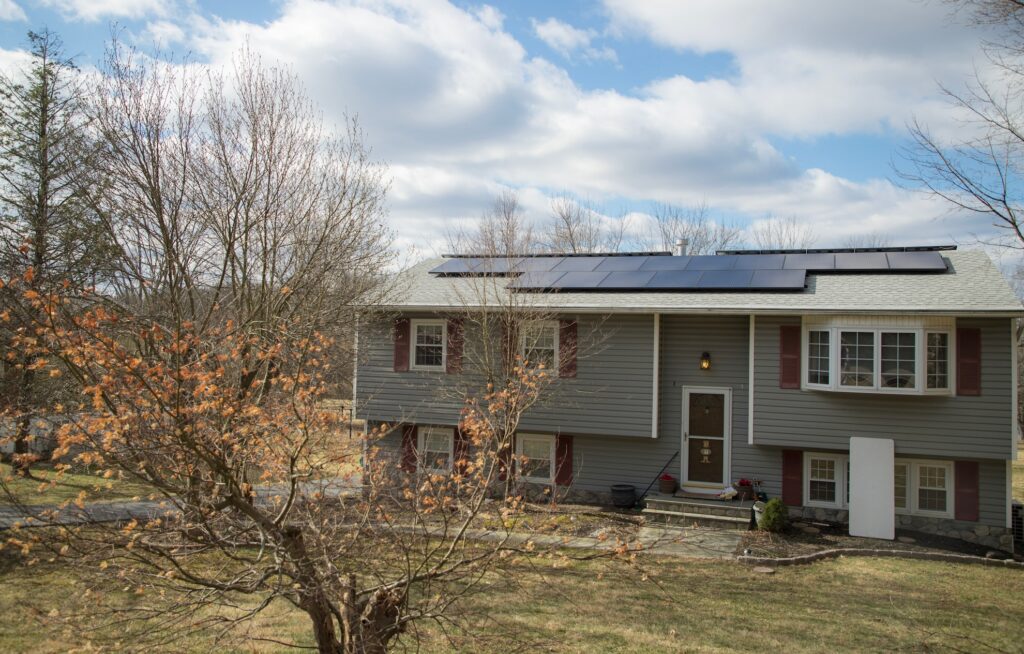
Solar panels turn your roof into a personal power plant that generates clean, renewable electricity for your home. They can power anything that runs on electricity, significantly reducing your electric bills and saving you money every month.
But just how much solar does it take to power a house? Is it possible for your house to run on solar power alone?
The answer is yes—but there are some important factors to take into account. In this guide, we’ll explore what it takes to achieve complete energy independence with rooftop solar and whether it’s the right choice for your home.
How Solar Panels Work to Power a House
Firstly, it’s essential to understand how solar power works. Solar power systems harness energy from the sun, convert it into electricity, and use that electricity to power your home.
A standard solar power system consists of several components:
- Solar panels: These are the most visible part of the system. Panels contain photovoltaic (PV) cells, which convert sunlight into direct current (DC) electricity.
- Inverter: This device transforms the DC electricity generated by your solar panels into alternating current (AC) electricity, which is the standard used by most household appliances.
- Battery storage: Solar batteries store excess solar power for use when the sun isn’t shining. They’re optional, but if you want to run your house on solar energy alone, you will need a battery.
- Bi-Directional Meter: A special two-way electric meter keeps track of the electricity you take from the grid and the electricity you feed into it, allowing you to participate in net metering.
How to Run a House on Solar Power Alone
Going 100% solar means your home produces all the energy it needs using solar panels. There are two ways to achieve this:
1. Off-Grid Solar
An off-grid solar system is completely independent of the utility grid, meaning you generate and store all the electricity you use. This setup requires a large solar panel array and significant battery storage. It allows you to run your home on solar alone, but it’s expensive and generally only recommended for remote houses without grid access.
2. Grid-Tied Solar with Battery Storage
For most homeowners, a grid-tied solar system with battery storage is the best path to energy independence—offering resilience and savings without the high costs of going completely off-grid.
This setup allows you to:
- Store solar energy in your battery for use at night and on cloudy days.
- Earn net metering credits that offset grid electricity use.
Batteries can be a significant investment, but they increase your solar power system’s independence and reliability. In the event of a power outage, a solar system with battery storage can keep your house powered, while a solar system without battery storage would shut down to prevent sending power back to the grid.
How Many Solar Panels Do You Need to Power a House?
One of the most important steps in any solar installation is sizing. Your solar panel system needs to be large enough to match your energy usage—especially if you want to run your house on 100% solar power.
When sizing your solar panel system, there are several key factors to consider, including:
- Energy consumption: Larger households or those with high electricity usage (for example, if you use electric heating or cooling, have an electric vehicle, or use a lot of energy-intensive appliances) will need a larger system than smaller households with lower energy usage. If your house uses a lot of power, consider making energy efficiency improvements like insulation and air sealing to reduce your consumption before going solar so you can install a smaller system.
- Location and shading: The amount of sunlight your location receives will affect how much energy your solar panels can produce.
- Roof orientation and tilt: The direction and angle of your roof can affect your solar power production. In the Northern Hemisphere, for instance, south-facing roofs are usually the best for solar power.
- Roof size: To run your house entirely on solar power, your roof must be large enough to support the number of solar panels you need.
For example, a 1,500 sq. ft. home with a $180/month electricity bill might need around 16 panels (10 kW system) to generate enough power. However, every home is unique. For a personalized estimate, reach out to Neeeco today!
Can Solar Power Support All Energy Needs?
Solar power can support most household energy needs, including lighting, electronics, and electric appliances. Energy-intensive appliances like an EV charger can significantly increase your home’s energy usage and may require a larger system. But with a properly sized solar panel system, you can meet all your electricity needs with solar power.
If your home has gas-powered appliances, however, they can’t be powered by solar panels. To be truly 100% solar-powered, you’ll need to switch to electric alternatives:
- Heat pumps (replace gas furnaces & water heaters)
- Induction cooktops (replace gas stoves)
- Electric dryers (replace gas dryers)
As a whole-home energy efficiency company, Neeeco can help you prioritize and make these upgrades.
Is 100% Solar Right for You?
Going completely solar-powered is possible, but for most homeowners, a grid-tied system with net metering is the best balance of cost and independence. Adding battery storage increases resilience and allows you to use even more solar power. But, full off-grid solar requires a significant investment and is usually not worth the cost if you have grid access.
